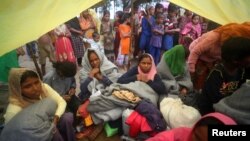The U.N. refugee agency is calling on governments to grant basic rights of citizenship to millions of stateless people who suffer discrimination, exclusion and persecution.
The United Nations High Commissioner for Refugees is making this plea on the third anniversary of a 10-year global campaign to prevent, reduce and eradicate statelessness.
The largest stateless minority group in the world right now is the Rohingya.
Although the Rohingya have lived in Myanmar for generations, the government does not recognize them as citizens. They are forced to live on the margins of society and are denied the most basic rights enjoyed by Myanmar nationals. Hundreds of thousands of Rohingya have fled to neighboring Bangladesh to escape violence and persecution.
The U.N. refugee agency reports there are more than 3 million stateless people around the world, with about 75 percent of them belonging to minority groups. The agency’s “IBelong” campaign to end statelessness highlights the reality that these individuals do not belong anywhere.
Carol Batchelor is the UNHCR’s international protection division director. She says stateless people are among the most bereft.
“If you live in this world without a nationality, you are without an identity,” she said. “You are without documentation. You are without the rights and entitlements that come, that we take for granted, even just being able to gather here today, having a job, having education, knowing that your child belongs somewhere.”
Progress has been made in reducing statelessness since the “IBelong” campaign began three years ago. Thousands of stateless people have been granted citizenship in places such as Thailand, central Asia, Russia, Kenya and West Africa; but the job is far from over.
The UNHCR urges all states to ease naturalization for stateless minority groups that fulfill certain residential requirements, grant citizenship to children in the country of their birth, and eliminate laws and practices that discriminate against people on ethnic and racial grounds.




